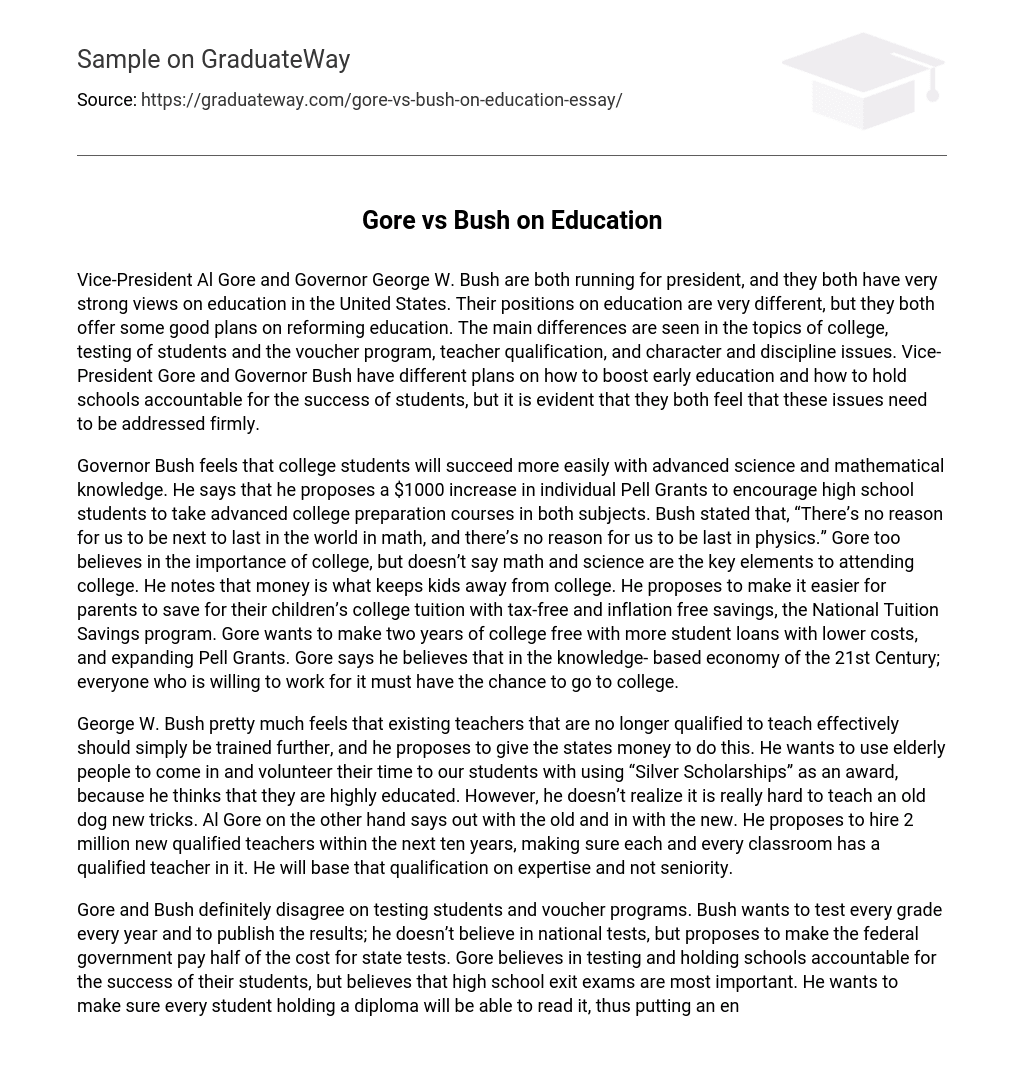Vice-President Al Gore and Governor George W. Bush are competing for the presidency, each with different opinions on education in the United States. Although they disagree on several aspects, both offer commendable ideas for reforming education. Specifically, there are differences in their views regarding college, student testing, voucher programs, teacher qualifications, and concerns about character and discipline. However, despite their contrasting strategies to improve early education and hold schools accountable for students’ success, it is evident that both candidates acknowledge the urgent need to address these issues.
Governor Bush believes that college students will have a higher chance of success if they possess advanced knowledge in science and math. He suggests increasing individual Pell Grants by $1000 to incentivize high school students to enroll in advanced college preparation courses in these subjects. According to Bush, it is unacceptable for the United States to rank near the bottom globally in math and physics.
Gore also recognizes the significance of a college education, although he does not specifically highlight math and science as critical subjects. He emphasizes that financial obstacles are the primary barrier preventing children from attending college. Gore proposes the National Tuition Savings program, which enables parents to save for their children’s college tuition with tax-free and inflation-free savings. Furthermore, he aims to make two years of college free by providing more affordable student loans and expanding Pell Grants. Gore asserts that in the knowledge-based economy of the 21st century, everyone who is willing should have an opportunity to pursue higher education.
George W. Bush suggests that underqualified teachers should receive further training, with the states receiving funding for this purpose. He also proposes to involve elderly individuals by awarding “Silver Scholarships” as an incentive for them to volunteer their time with students, assuming they possess higher education. However, Bush may overlook the challenges of teaching someone who is set in their ways. On the other hand, Al Gore advocates for replacing the old with the new. He aims to hire 2 million qualified teachers over the next decade, ensuring every classroom has a competent teacher. Gore’s focus is on expertise rather than seniority when determining qualification.
Gore and Bush have contrasting views on testing students and voucher programs. Bush advocates for yearly testing in every grade and publishing the results. He opposes national tests but suggests that the federal government should cover half the cost of state tests. On the other hand, Gore supports testing and holding schools accountable for student success, prioritizing high school exit exams. He aims to ensure that all graduating students can read their diplomas, thus discontinuing social promotion. While Bush supports voucher programs, Gore strongly opposes them and proposes alternative innovative spending initiatives for education.
When it comes to character and discipline, both Bush and Gore agree on the need for reform. However, their approaches differ. Bush supports a zero tolerance policy and molding students into what he considers a “distinguished character.” On the other hand, Gore advocates for the establishment of second-chance schools, afternoon schools for teenagers, and smaller class sizes. Bush believes in sending discipline-problem students to boot camps and juvenile justice systems, while Gore believes that all children deserve a second chance at success in life and his plans aim to help troubled kids. Gore sets a goal for every state to work towards closing the achievement gap between different backgrounds, whether rich or poor, urban, suburban, or rural by the end of 2005. He envisions a school system that holds every student, every school, and every state accountable for tangible results.
Both Al Gore and George W. Bush agree on the importance of a child’s early learning abilities and educational foundation. They believe that reforming early education is crucial for the success of our students. Bush is prioritizing reading and phonics, aiming to ensure that teachers are effectively teaching children how to read. He suggests that these reading skills should be developed in the first and second grades. On the other hand, Vice-President Gore wants to provide learning skills to 3 and 4 year olds so that they can absorb reading and phonics instruction when they enter kindergarten. In short, Gore believes that early education for all 4 year olds is an essential stepping-stone to their educational success!
Despite their differences on education, both Gore and Bush share a common goal of reforming it. However, Gore presents more practical ideas with a genuine concern for the issues, while Bush’s proposals come off as arrogant attempts to win votes. One area where both candidates fall short is addressing how to effectively teach in a multicultural society, a crucial concern for our nation’s teachers.





